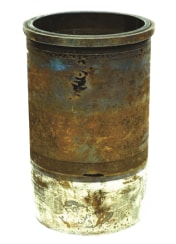A typical coolant/antifreeze formulation is 96% water and glycol. It efficiently transfers heat out of a hot engine and prevents freeze-ups in a cold one. But that last 4% (additives) is important and can have a lasting impact on your engine.
In heavy-duty diesel engine applications, coolant/antifreeze formulations prevent cavitation and pitting in wet sleeve liners. Wet sleeve cylinder liners are replaceable metal sleeves inserted into a diesel engine block. Their purpose is to improve heat transfer and enhance serviceability of heavy-duty engines. Damage to these liners can be one of the most common and costly cooling system repairs.
 Wet Sleeve Liner Cavitation
Wet Sleeve Liner Cavitation
Cavitation occurs in wet sleeve liners from the rapid formation and collapse of vapor bubbles. These bubbles generate from vibrations as the piston moves up and down. High pressure in small areas cause collapsing bubbles to beat the liner and create small holes (known as pitting) into the liner wall.
If allowed to progress, the holes eventually penetrate through the liner wall. This allows oil and coolant/antifreeze to mix.
Coolant/antifreeze additives, referred to as inhibitors, prevent this catastrophic occurrence. Additives form a protective surface on the liner wall. The wall shields the metal from the effects of the vapor bubble implosion and subsequent pitting.
Inhibitors
Two general categories of inhibitors exist: inorganic and organic.
Inorganic metals create a strong plating film on the liner surface and are most often found in conventional fluids. They act fast and cover all components throughout the cooling system equally. Unfortunately, they deplete rapidly resulting in brief protection. Supplemental coolant additives (SCAs) prolong protection when added regularly.
Organic acid technology (OAT) inhibitors are the preference of most OEMs today. They eliminate the need to add SCAs or hassle with SCA maintenance. OAT inhibitors activate at trouble spots as needed. Instead of covering the entire system equally, they protect the cooling system in a targeted way.
OAT inhibitors last much longer than inorganic inhibitors. OAT technology protects engines up to a million miles, 20,000 hours, or eight years! Another similar technology, nitrite organic acid technology (NOAT), contains an organic inhibitor plus nitrite and offers additional wet sleeve liner protection.
The FS Solution
Selecting the right coolant/antifreeze for your application can be confusing. Contact your local FS Energy Specialist to determine if OAT, NOAT, conventional, or pre-diluted best meet your needs. We provide a full line of coolant/antifreeze products for any application.